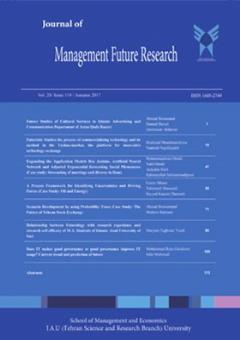Identify the drivers that affect the evaluation of industrial development policies with a futuristic approach
Subject Areas : FuturologyNader Naruei 1 , Abdolali Keshtegar 2 , Bahreh Naseri 3
1 - Department of management, Faculty of management and economics, Islamic Azad University, Zahedan, Iran
2 - Department of Management, Faculty of management and Economics, University of Sistan and Baluchestan, Zahedan, Iran
3 - Department of management faculty of management and economic Islamic azad university zahedan iran
Keywords: Policy Evaluation, Industrial Development, futuristic approach, MicMac Method, Scenario Writing,
Abstract :
Objective: The purpose of this study is to investigate the drivers of effective evaluation of industrial development policies using a futuristic approach. Method: The present study is applied in terms of purpose and descriptive-analytical in terms of data collection and exploratory approach. The statistical population of the present study includes experts and specialists in political-making and economics, which has been select by the method of snowball. Library studies containing 36 variables of propellants were used to identify the drivers and the MicMac questionnaire was used to collect data. In addition, MicMac software and scenario wizard have been use to analyze the data. Results: By entering the data obtained from the experts' response in MicMac software, out of 36 propellants, 19 propellants were identified as the best variables. In addition, to evaluate the future of the evaluation of industrial development policies, for 19 main drivers, favorable to unfavorable situations were designed as possible scenarios and then referred to the relevant experts. Findings from the analysis of existing scenarios, 8 main scenarios were identified. Conclusion: Research results in MicMac method, Stakeholder, Problem-oriented, Innovation, Judgment, Value, political competencies, Action commitment, Social competence, Acceptability, Comprehensiveness, Perceptual and analytical competencies, Based on rationality, Efficiency and effectiveness, Test, Participation, Technical competence and goal orientation variables were identified as the main variables. Also, in the scenario writing method, eight important scenarios were identified that the first, second and fourth scenarios were the best scenarios.


